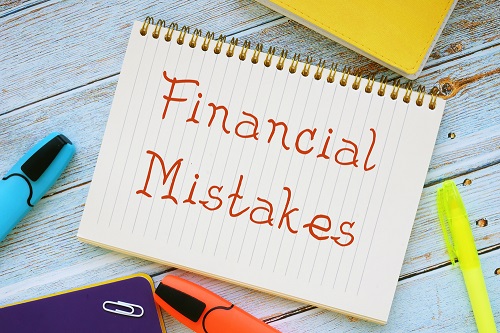Here, we’ll look at some of the most typical monetary errors that frequently result in severe financial difficulties. Even if you are already in financial trouble, avoiding these errors may be the difference between life and death.
1. Overspending and Unnecessary Expenses
Large sums of money are sometimes lost one dollar at a time. When you order that pay-per-view movie, go out to dinner, or buy that double-mocha coffee, it might not seem like a huge issue, but everything adds up.
Spending just $25 a week on eating out costs you $1,300 year, which might be used to cover numerous additional credit card, auto, or other payments. Avoiding this error is crucial if you’re struggling financially; after all, if you’re just a few dollars from foreclosure or bankruptcy, every penny will matter more than before.
2. Living off of Borrowed Funds
Using credit cards to pay for necessities has become rather typical. But even if more and more consumers are willing to pay double-digit interest rates on groceries, petrol and a variety of other products that are gone before the bill is fully paid, doing so is not a prudent financial decision. The cost of the things that are charged is significantly increased by credit card interest rates. Occasionally, using credit may result in you spending more than you make.
3. Not Making Retirement Investments
You might never be able to stop working if you do not put your money to work for you in the markets or through other investments that generate income. For a comfortable retirement, making monthly contributions to designated retirement accounts is crucial.
Utilise your employer-sponsored retirement plan and/or tax-deferred retirement assets. Know how long it will take for your investments to grow and how much risk you can take. If feasible, seek the advice of a seasoned financial counsellor to match this with your objectives.
4. Using Savings to Settle Debt
If your debt is costing you 19% of your income but your retirement account is earning 7%, you might believe that switching the retirement for the debt will result in you pocketing the difference. But it’s not quite that easy.
It is quite difficult to repay those retirement savings, and you risk being charged exorbitant costs, in addition to losing the benefit of compounding. Borrowing from your retirement account can be an option if you approach it in the proper way, but even the most diligent planners struggle to put money aside to rebuild these funds.
When the debt gets paid off, the urgency to pay it back usually goes away. It will be very tempting to continue spending at the same pace, which means you could go back into debt again. If you are going to pay off debt with savings, you have to live like you still have a debt to pay—to your retirement fund.
5. Living Paycheck to Paycheck
The personal savings rate for American households in June 2021 was 9.4%.2 Many families may be living paycheck to paycheck, so if you are unprepared, an unexpected issue could quickly turn into a catastrophe.
People find themselves in a hazardous situation where they need every dollar they make and one missed payment would be terrible as a result of their cumulative expenditures. You do not want to be in this situation when an economic downturn occurs. You’ll have very few choices if this occurs.
Keep three months’ worth of spending in an account that is easy to access, according to several financial advisors. Loss of employment or changes in the economy could drain your savings and place you in a cycle of debt paying for debt. A three-month buffer could be the difference between keeping or losing your house.
6. Investing in a New Car
Even though only a small percentage of consumers can afford to pay in cash, millions of new cars are sold each year. However, being unable to pay cash for a new car can also indicate that you cannot afford it. After all, having the money to make the payment is not the same as having the money to buy the car.
Additionally, by taking out a loan to acquire a car, the buyer is paying interest on a depreciating asset, which enlarges the gap between the car’s worth and the amount paid for it. Even worse, a large number of people trade in their cars every two to three years, losing money each time.
A person may occasionally be forced to obtain a loan in order to purchase a vehicle, but how many people actually require a large SUV? Such cars cost a lot to acquire, insure, and fuel. Unless you need an SUV to make a living or you tow a boat or trailer, buying one might be costly.
Consider purchasing a car that uses less gas, is less expensive to insure, and requires less maintenance if you need to buy one and/or borrow money to do so. Because cars are expensive, if you purchase more than you need, you can be wasting money that could have been saved or applied to debt repayment.
Conclusion
Start by keeping an eye on the small expenses that quickly pile up in order to avoid the risks of overspending, and then go on to monitoring the larger expenses. Before adding new debts to your list of obligations, consider your options carefully. Also, keep in mind that being able to make a payment does not necessarily equate to being able to afford the purchase. Finally, make saving a portion of your income and taking the time to create a healthy financial plan a monthly priority.
